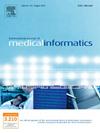What digital competencies should medical students in China possess in the AI era?
IF 4.1
2区 医学
Q2 COMPUTER SCIENCE, INFORMATION SYSTEMS
International Journal of Medical Informatics
Pub Date : 2025-07-12
DOI:10.1016/j.ijmedinf.2025.106043
引用次数: 0
Abstract
Objective
With the advancement of the digital society and the extensive application of digital medical technologies, the demand for digital competencies among medical students is becoming increasingly critical. Digital competence of medical students refers to the ability of medical students to effectively select and use digital or intelligent technologies and applications to accomplish their studies, research, and future clinical practice. Currently in China, no digital competency framework for medical students has been established based on clinical practice requirements. Therefore, the study aimes to investigate digital competencies for medical students and provide recommendations for future digital competency training initiatives and framework development.
Methods
Focusing on competency theory, we reviewed and analyzed literature related to digital competency. Twenty experts participated in a two-round Delphi method to iteratively refine and correct the indicator items. Finally, the weights of indicators were calculated through the Analytic Hierarchy Process.
Results
Twenty experts were invited to participate in two rounds of the Delphi survey, achievinga 100 % response rate in both rounds, with Expert Authority Coefficients of 0.81 and 0.82, indicating the credibility and professional expertise the panelists. Furthermore, Kendall’s consistency coefficient (Kendall’s W) ranged from 0.143 to 0.275 (p < 0.05), indicating that experts reached a consensus on the indicators. The final framework comprises 3 domains, 9 primary indicators, and 27 secondary indicators.
Conclusions
A digital competency framework for medical students was developed using the Delphi method. This framework facilitates the self-development of medical students and serves as a reference for the development of digital medical curricula.
在人工智能时代,中国的医学生应该具备什么样的数字能力?
目的随着数字社会的发展和数字医疗技术的广泛应用,医学生对数字能力的需求日益迫切。医学生数字化能力是指医学生有效选择和使用数字化或智能化技术和应用程序来完成学习、研究和未来临床实践的能力。目前在中国,还没有建立基于临床实践要求的医学生数字化能力框架。因此,本研究旨在调查医学生的数字能力,并为未来的数字能力培训计划和框架发展提供建议。方法以胜任力理论为核心,对数字化胜任力相关文献进行梳理和分析。20位专家参与了两轮德尔菲法,迭代完善和修正指标项目。最后,通过层次分析法计算各指标的权重。结果共邀请20名专家参加了两轮德尔菲调查,两轮调查的回复率均为100%,专家权威系数分别为0.81和0.82,反映了专家的可信度和专业程度。此外,Kendall的一致性系数(Kendall 's W)在0.143 ~ 0.275之间(p <;0.05),表明专家对指标达成共识。最终框架包括3个领域、9个一级指标和27个二级指标。结论采用德尔菲法编制了医学生数字化胜任力框架。该框架有利于医学生的自我发展,并可为数字化医学课程的开发提供参考。
本文章由计算机程序翻译,如有差异,请以英文原文为准。
求助全文
约1分钟内获得全文
求助全文
来源期刊

International Journal of Medical Informatics
医学-计算机:信息系统
CiteScore
8.90
自引率
4.10%
发文量
217
审稿时长
42 days
期刊介绍:
International Journal of Medical Informatics provides an international medium for dissemination of original results and interpretative reviews concerning the field of medical informatics. The Journal emphasizes the evaluation of systems in healthcare settings.
The scope of journal covers:
Information systems, including national or international registration systems, hospital information systems, departmental and/or physician''s office systems, document handling systems, electronic medical record systems, standardization, systems integration etc.;
Computer-aided medical decision support systems using heuristic, algorithmic and/or statistical methods as exemplified in decision theory, protocol development, artificial intelligence, etc.
Educational computer based programs pertaining to medical informatics or medicine in general;
Organizational, economic, social, clinical impact, ethical and cost-benefit aspects of IT applications in health care.
 求助内容:
求助内容: 应助结果提醒方式:
应助结果提醒方式:


